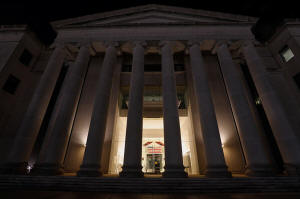Three Alabama providers halt IVF after high court rules embryos are
children
 Send a link to a friend
Send a link to a friend
 [February 23, 2024]
By Julia Harte [February 23, 2024]
By Julia Harte
(Reuters) -At least three Alabama providers of in vitro fertilization
have halted treatments since the state Supreme Court on Friday said
frozen embryos in test tubes should be considered children, casting
doubt on future access to the procedure in the state.
The ruling by the court, whose elected judges are all Republican, has
left doctors and patients wondering how to legally store, transport, and
use embryos in Alabama.
Health advocates say by enshrining the idea of "fetal personhood," the
ruling could also inspire further restrictions on women's reproductive
freedom around the United States.
The University of Alabama at Birmingham said on Wednesday it had paused
IVF for fear that "our patients and our physicians could be prosecuted
criminally or face punitive damages for following the standard of care
for IVF treatments."
Two other providers, Alabama Fertility and the Center for Reproductive
Medicine at Mobile Infirmary, announced on Thursday that they had also
paused IVF treatments. Six other Alabama fertility service providers did
not respond to Reuters questions about their intent to continue the
service. It was difficult to pin down how many such facilities are in
Alabama.

Between them, the three providers that have already halted treatments
used assisted reproductive technology to achieve more than 400
pregnancies in 2021, the most recent year for which data was available
from the U.S. Centers for Disease Control and Prevention.
President Joe Biden, a Democrat, said in a statement on Thursday that
the ruling had put access to fertility treatment "at risk for families
who are desperately trying to get pregnant," and that it showed
"outrageous and unacceptable" disregard for personal choice.
Biden called the ruling a "direct result" of the 2022 U.S. Supreme Court
decision to overturn its landmark 1973 Roe v. Wade decision that had
recognized women's constitutional right to abortion.
Republican presidential candidate Nikki Haley on Wednesday said in an
interview that she believed embryos were "babies." But in comments on
Thursday to CNN Haley said she disagreed with the Alabama court's ruling
and believed Alabama law needed to be reviewed.
[to top of second column]
|

Alabama Judicial Building, where the state supreme court meets, is
seen in Montgomery, Alabama, U.S. September 26, 2019. Picture taken
September 26, 2019. REUTERS/Chris Aluka Berry
 "We don't want fertility treatments
to shut down," Haley said. "We don't want them to stop doing IVF
treatments. We don't want them to stop doing artificial
insemination."
The former South Carolina governor has said she had her own son
after using artificial insemination, a different procedure which
does not involve embryos in a lab.
The Alabama case was brought by three couples seeking damages from a
center storing their frozen embryos after a patient accessed and
destroyed them.
The high court ruled that Alabama's constitution clearly considered
embryos "unborn children ... without exception based on
developmental stage, physical location, or any other ancillary
characteristics," citing a constitutional amendment that Alabama
voters approved in 2018 which granted fetuses full human rights,
including the right to life.
IVF treatment typically involves the creation of multiple embryos in
order to maximize the chance of a successful pregnancy, leaving some
unused.
Republican Alabama state lawmaker Tim Melson said on Thursday he
planned to file a bill that could shield IVF providers from legal
risk by clarifying that embryos are not viable until they are
implanted in the uterus, according to local news reports.
Alabama Fertility urged its social media followers to push their
elected officials to support the legislation.
"At a time when we feel so powerless, advocacy and awareness is our
strongest tools," the provider wrote in an Instagram post on
Thursday.
(Reporting by Julia Harte; additional reporting by Eric Beech;
editing by Donna Bryson, Jonathan Oatis and Rosalba O'Brien)
[© 2024 Thomson Reuters. All rights reserved.]This material may not be published,
broadcast, rewritten or redistributed.
Thompson Reuters is solely responsible for this content.
 |